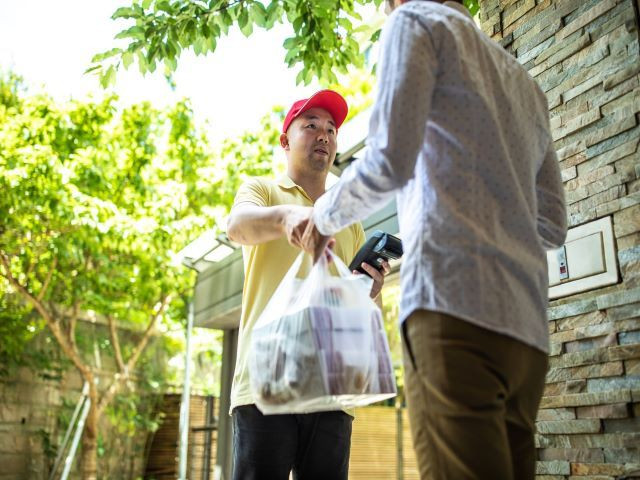Based on the amount of services I hire out, I just might be single-handedly keeping the gig economy alive.
Gone are the days I spend my weekends wandering the aisles of the supermarket, grocery list in hand, hemming and hawing over which Greek yogurt to buy or whether or not to try the newest flavor of seltzer water. (What is a razzleberry, anyway? Does it taste more like razzle or berry? Can you take a Pinterest-worthy family portrait in a razzleberry field/orchard/patch?). Nope, I just punch my order into Instacart, and before I could even have wrangled my reusable shopping bags and buckled my toddler into her car seat, everything is at my doorstep.
Two weeks ago I needed to move a 300-pound bathroom vanity up a flight of stairs. I contacted a local company called Rent Sons, and within a few days there were four young men eager to make a buck and help me out.
I’ve used Amazon Home Services to find a house cleaner and almost booked a cat sitter through Rover (a friend stepped in to help at the last minute).
Please don’t think that I spend all my newfound free-time lounging on my beige leather recliner, languidly eating grapes while the estimated 75 million gig workers, according to The Federal Reserve, do my bidding. My schedule is packed with school and daycare drop-offs, a 9-to-5, two freelance jobs that help me keep my skills sharp and pad my pocket for Instacart splurges, and at least three Jazzercise classes a week where I sweat it out as an instructor. (I also just completed my master’s degree 100-percent online last December.) Every day after bedtime stories and seventeen tuck ins, I’m lucky to fall into the above said beige recliner for 30 minutes of Netflix before I do it all again.
Even if you still think I’m lazy, I have science to back up my gig-economy addiction: It turns out that spending money to save time—42 hours to be exact, according to my Instacart app … that’s nearly two days of my life not spent picking out toilet paper—can actually make you happier, according to a study from the Proceedings of the National Academy of Sciences.
Why am I sharing all this?
Because until Saturday evening, I had yet to personally use a food-delivery app. I was way behind the times: Grubhub was first to the market in 2011, followed by DoorDash in 2013, and UberEats a year later. It’s a trend those studying food-service management should pay attention to: A 2019 State of the Industry report by The National Restaurant Association reports that 60 percent of all restaurateurs say that to-go-order sales are higher than two years ago.
For us, it was all about convenience. My husband and I had visions of our family peacefully splitting a pizza at a local restaurant-arcade, but by 5 o’clock it was clear that in order to do so, we’d have to buckle the toddler, who was hungry NOW, into a car seat (non-parents, I know I am repeating myself but this is a process) and then proceed to chase her and her sister around the restaurant in between bites of pizza, which would be the only game of pinball we’d get to play.
Instead, I went to the website of our favorite neighborhood pizza joint, clicked “order online,” and then signed up for Grubhub.
While I had heard about the self-confessed yet unwanted “quality control” initiatives related to these apps in the headlines—a quarter of drivers surveyed admit to eating customers’ food—at the time, I did not realize the flurry around restaurant-delivery companies and tipping: DoorDash, in particular, has taken a lot of heat. (Even my beloved Instacart was initially scrutinized, although it has changed its tipping policy to accommodate drivers.)
To put it simply, DoorDash guarantees drivers a fee per delivery; however, the company then uses any tip given to meet that minimum, if necessary. Drivers and customers, who had been under the impression that tips exist above and beyond the bottom line, not to meet it, were justifiably miffed.
In a recent interview, Johnson & Wales University College of Hospitality Management professor Paul Bagdan, Ph.D., who teaches at the Providence campus and online, said that despite the uproar, food-delivery companies like DoorDash are going to continue to ask users if they’d like to add a tip. “It seems as if people do at least give a small, token amount,” he said. “And that’s why they’re soliciting this — because they can.”
A US Foods survey backs him up: Ninety-five percent of customers tip their food-delivery drivers, with the majority using the app.
For now, DoorDash has not changed their tipping policies, just made sure they were more transparent to their drivers.
Will the muddiness of tipping policies impact business operations for this growing segment of the industry? It seems to depend on your side of the order: Drivers’ main complaint is weak tip/no tip, but consumers just want their food hot and fresh. Seems like, for now, a side of ethics is just too much to swallow.
Learn more about earning your food service management bachelor’s degree online at JWU. Complete the “Request Info” form on this page or call 855-JWU-1881. Click here for information on our other degree programs.
